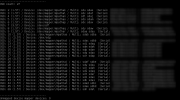Your missing the keyringmultipath code block in this doesn't work.
I tried fixing it up but still doesn't work
Bash:for f in $(multipath -l | grep dm- | awk '{ print $1 }') do pvcreate --metadatasize 250k -y -ff /dev/mapper/$f-part1 vgcreate vg$f /dev/mapper/$f-part1 lvcreate -n lv0 -l 100%FREE vg$f ceph-volume lvm prepare --data /dev/vg$f/lv0 done ceph-volume lvm activate --all
I get
Code:Physical volume "/dev/mapper/35000cca03100fe6c" successfully created. Volume group "vg35000cca03100fe6c" successfully created Logical volume "lv0" created. Running command: /usr/bin/ceph-authtool --gen-print-key Running command: /usr/bin/ceph --cluster ceph --name client.bootstrap-osd --keyring /var/lib/ceph/bootstrap-osd/ceph.keyring -i - osd new 895b1b2b-2677-4d1b-8274-605c3567ad55 stderr: 2022-07-28T13:09:06.065+0100 7fd9f8f8e700 -1 auth: unable to find a keyring on /etc/pve/priv/ceph.client.bootstrap-osd.keyring: (2) No such file or directory stderr: 2022-07-28T13:09:06.065+0100 7fd9f8f8e700 -1 AuthRegistry(0x7fd9f405b868) no keyring found at /etc/pve/priv/ceph.client.bootstrap-osd.keyring, disabling cephx stderr: 2022-07-28T13:09:06.069+0100 7fd9f359e700 -1 auth: unable to find a keyring on /var/lib/ceph/bootstrap-osd/ceph.keyring: (2) No such file or directory stderr: 2022-07-28T13:09:06.069+0100 7fd9f359e700 -1 AuthRegistry(0x7fd9f405b868) no keyring found at /var/lib/ceph/bootstrap-osd/ceph.keyring, disabling cephx stderr: 2022-07-28T13:09:06.069+0100 7fd9f359e700 -1 auth: unable to find a keyring on /var/lib/ceph/bootstrap-osd/ceph.keyring: (2) No such file or directory stderr: 2022-07-28T13:09:06.069+0100 7fd9f359e700 -1 AuthRegistry(0x7fd9f4061d40) no keyring found at /var/lib/ceph/bootstrap-osd/ceph.keyring, disabling cephx stderr: 2022-07-28T13:09:06.069+0100 7fd9f359e700 -1 auth: unable to find a keyring on /var/lib/ceph/bootstrap-osd/ceph.keyring: (2) No such file or directory stderr: 2022-07-28T13:09:06.069+0100 7fd9f359e700 -1 AuthRegistry(0x7fd9f359d0d0) no keyring found at /var/lib/ceph/bootstrap-osd/ceph.keyring, disabling cephx stderr: [errno 2] RADOS object not found (error connecting to the cluster) --> RuntimeError: Unable to create a new OSD id
See https://forum.proxmox.com/threads/u...-found-error-connecting-to-the-cluster.78961/


